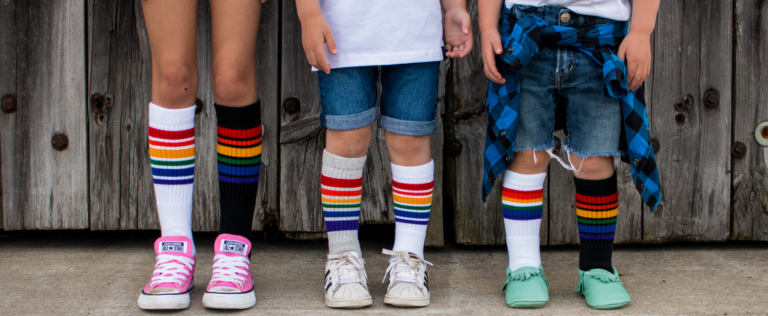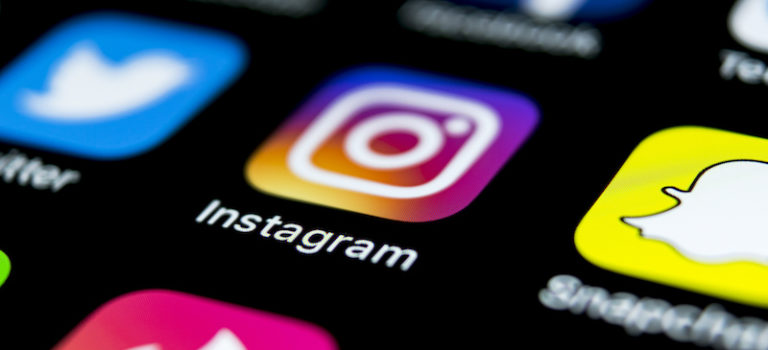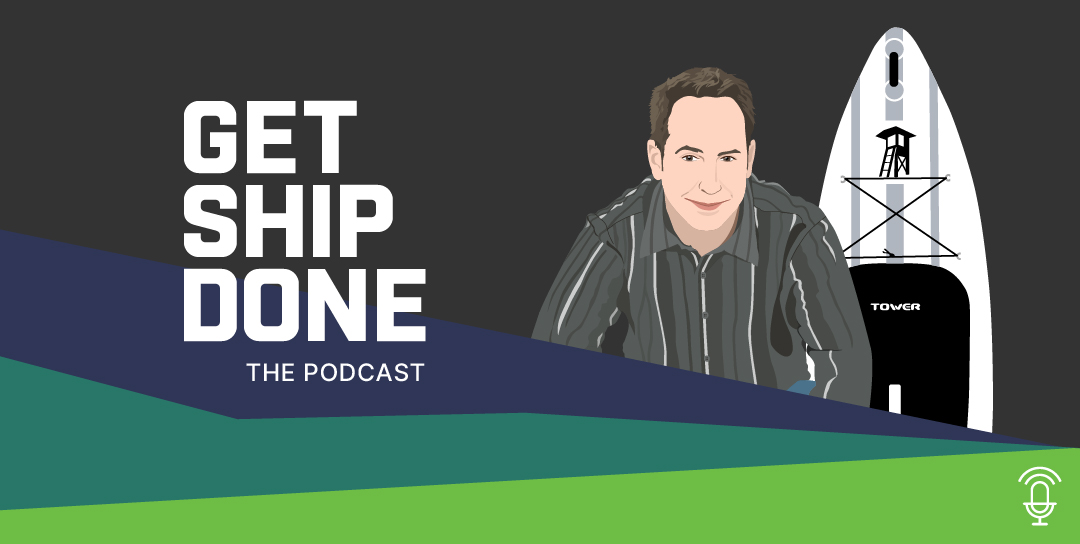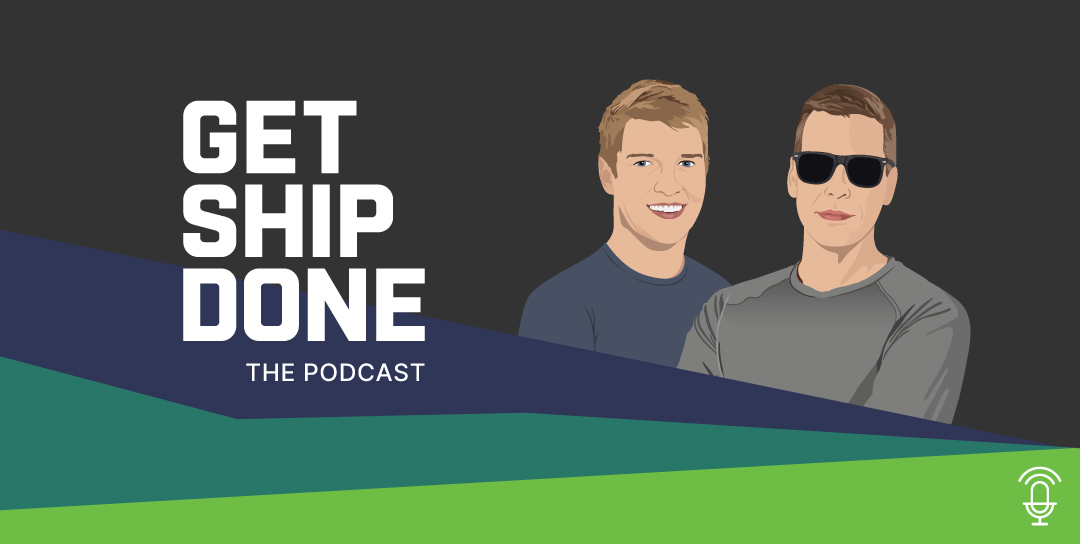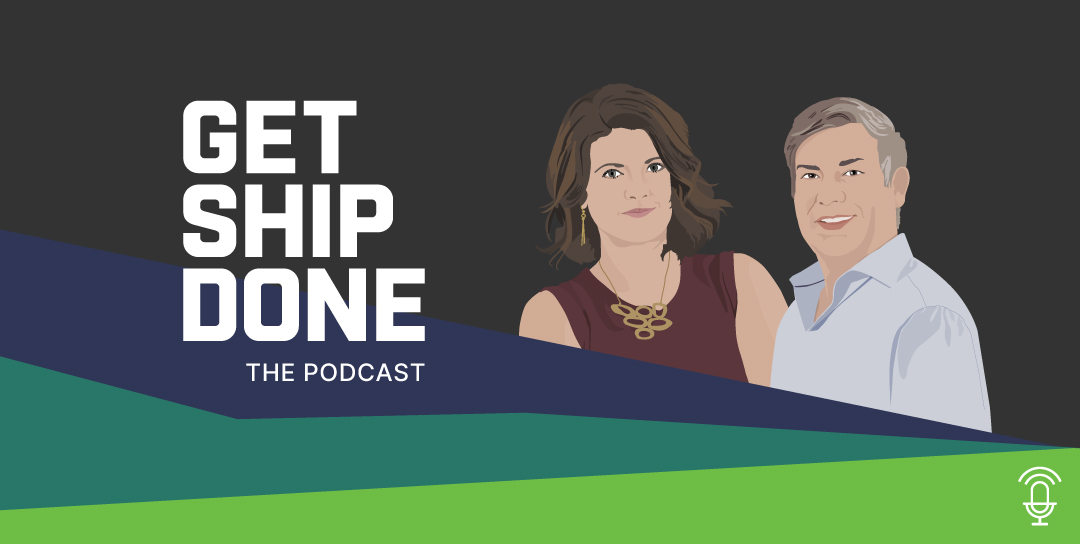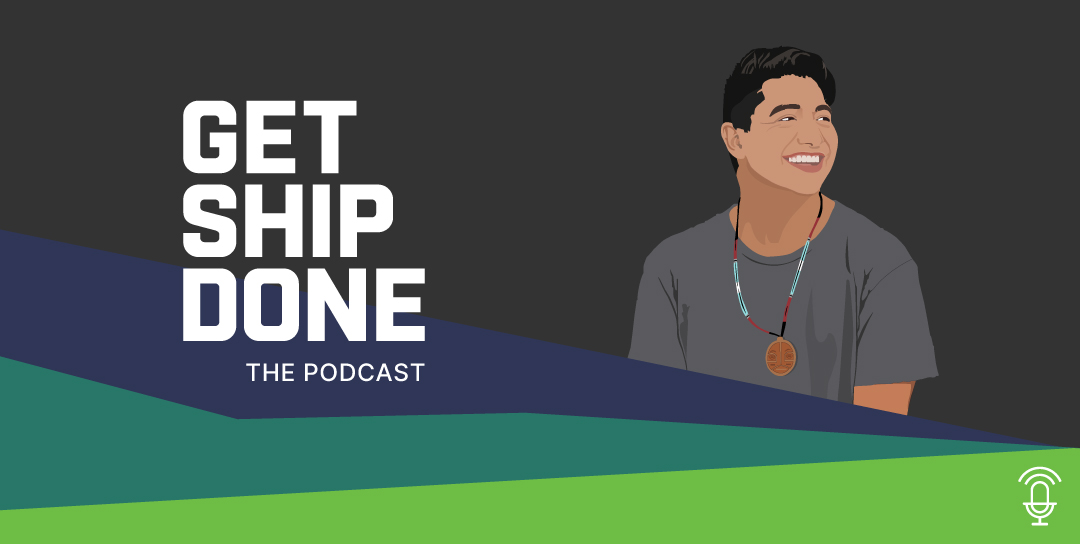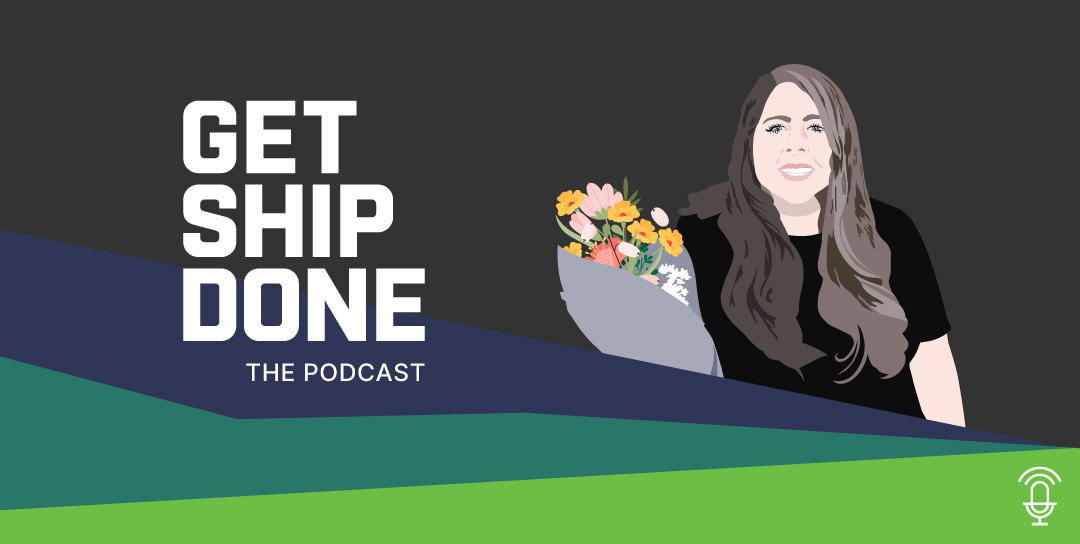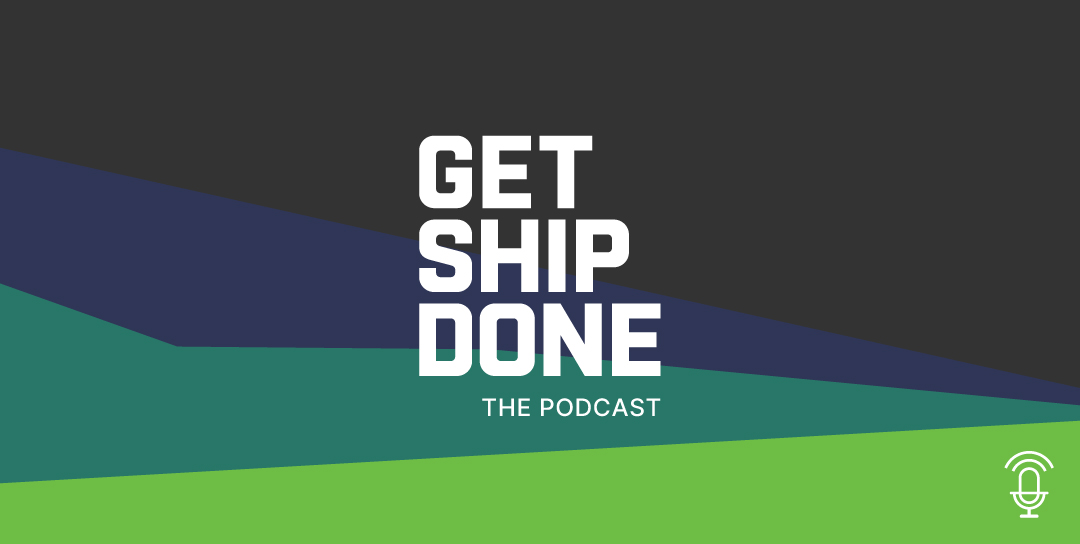Get Ship Done Podcast Episode 3: Pride Socks: The Gold at the End of the Rainbow
Pride Socks founder Rachel Smith is as passionate about living an authentic life as she is about the perfect tube sock. When she started Pride Socks in 2011, Rachel’s goal was to form a brand that would celebrate the uniqueness of people as well as capture a sense of pride. For Pride Month 2022, it is our pleasure to welcome Rachel to the podcast to discuss everything from ecommerce success to rainbows and rollerskating.
Read the full transcript for Get Ship Done Episode 3: Pride Socks
J.B. Hager (Host):
You’re hearing this episode thanks to our partners at Wix who are trusted by over 700,000 online stores. That’s why they are a leading ecommerce platform. And the great thing about Wix is you can build a state-of-the-art online store, you can sell in person, across mobile, social media, and multiple online marketplaces. Start growing your business today. Go to wix.com/ecommerce and grow your business.
Welcome back to the show, this is Get Ship Done brought to you by ShipStation. My name is J.B. Hager, and I’m excited to talk to this very inspiring woman, Rachel Smith, Founder of Pride Socks. This Austin, Texas-based apparel brand has taken the beloved tube sock and turned it into a statement piece that helps spread the message of love, pride, respect, and inclusion for everyone.
You’ve told the story many, many times about the beginnings of it. So let’s move through that pretty quick and then get to some nitty-gritty of where you are today with Pride Socks if that’s okay, Rachel.
Rachel Smith:
Okay. Not a problem.
J.B. Hager (Host):
I think it’s fascinating that you were a teacher, an underpaid teacher, like they all are in special ed, right?
Rachel Smith:
Yes. I taught special ed. Most of my kids had emotional disabilities.
J.B. Hager (Host):
And you’re just not making enough money. It’s not making ends meet, and you’re like, “I got to do something else.” Which, just hearing you tell that story on some other interviews, it just made me sad that you had to do that just to get by, but it led you down a completely different path to start Pride Socks.
Rachel Smith:
So it’s not like I looking to replace teaching. I needed a supplemental income because I was serving tables for… I started serving tables to put me through college and graduate school and I loved serving tables and, but I was looking for something different. And that’s when I continued to ask my brother who also owns a sock company if I could do sales for him.
Rachel Smith:
And after a couple of years, and probably my brother just being done with me asking him over and over, he’s finally said to me, “Rachel, leave me alone and do your own thing.” And that’s when I was like, “Oh, did you just challenge me?” And that’s when Pride Socks started at the end of that conversation.
J.B. Hager (Host):
And I think its really evolved into something else, something bigger and not just socks. You started with just the rainbow stripe tube socks, right? Which I remember as a kid, I thought stripe tube socks were the coolest things and I wanted them tall. And my mom came home like a new school year. It was the only time I got new clothes and they were just plain white socks, and I was so heartbroken, and that she’s like, “It says tube socks on the bag here.” And I go, “Mom, you don’t understand, I want some stripes on it.” You know?
Rachel Smith:
Yeah.
J.B. Hager (Host):
So I’ve always had a love affair with stripe socks. And so you started doing that and take us to the moment where you said, “You know what? I got to do this full time.” What was that like?
Rachel Smith (Host):
Oh man, that was quite the journey. And so I was teaching and running Pride Socks and coaching high school all at the same time, and I was four years into that. And every single position required full-time attention and I just couldn’t do it anymore. And Pride Socks was starting to be at the level where I could quit teaching in based on my income. And so it was after four years of doing all three at the same time I had to quit.
J.B. Hager:
You say coaching, were you a running coach? You think you’re a runner, right?
Rachel Smith:
Yes.
J.B. Hager (Host):
Yeah, you’re still a runner?
Rachel Smith:
Well, it’s funny. I ran for 15 years and then one day I was at Town Lake and I said, “You know what? I’m done.” This was my last run. I’m done. And I quit running for 12 years. And then after giving birth to my daughter a year and a half ago, I said, “You know what? I think I want to run again.” And I’ve been running for the last year and a half.
J.B. Hager (Host):
Just so people have a better understanding of Pride Socks, let’s talk about design and then we’ll get into some of the other things you’ve added since you just did the rainbow tube socks at the beginning, but let’s start with the design process. Is that all created by you? Are you a designer at heart?
Rachel Smith:
I’m becoming a designer. A lot of things are coming out that I didn’t realize I was since starting Pride Socks, but when my brother challenged me and I hung up the phone and I was like, “All right, this is it.”
My partner and I literally busted out with a magic marker and some crayons, and we designed different rainbow patterns of the stripe patterns.
Rachel Smith:
And we came up with 10 and then I flew out to the manufacturer with three designs specifically to start off with, and we have added those 10 designs, but we started off with three of them, but it’s been my partner and I making those designs internally.
J.B. Hager (Host):
And then it’s evolved to more stuff. When did you start adding t-shirts too? Because I think they’re amazing.
Rachel Smith:
Oh man, the t-shirts have been really fun. It’s probably been about seven or eight years. People started asking for more product because I went to a lot of different prides and I’ve been going to prides for about nine, ten years and people wanted more products and they wanted t-shirts. And so it was taking my vision with the socks and putting it on a shirt in that when somebody walks by and looks at one of our t-shirts, of somebody wearing our t-shirts, I wanted to start that internal dialogue within that person as well and get them to stop and go, “Wait a minute, living the dream and having them think about themselves in their life and how they can live a life that they’re proud of and moving forward in that positive thought process.”
And so it’s been a really fun ad to add the t-shirts and then we’ve added different positive accessories. We’ve added beanies and hats and it really all is in alignment within that. For the wear, let’s say they’re having a bad day and they don’t really want to go for that run or they don’t want to go to work, and they put on our product and each one of our products has a different name. And so it’s that reminder that yes, you are fearless. Yes, you have the grit. Yes, you have the strengths to be able to carry on each day and be proud.
J.B. Hager (Host):
And then you went on to add an artist series which is very cool.
Rachel Smith:
Yes.
J.B. Hager (Host):
Did that happen because you reached out to artists or they reached out to you because they loved what you were doing?
Rachel Smith:
Okay. So it started based on one artist reaching out to me asking me if she could design socks. And I was like, “Wait a minute, this is a brilliant idea.” It’s not a brand new concept. There’s other people, big brands, that’s what they do, and then it was all in the midst of during COVID as well. And I was like, “Wait a minute. COVID just isn’t affecting us, it’s affecting artists because they’re not having artist’s shows.”
And so it was our way of collaborating with an artist and putting their design on a sock when it’s usually on a canvas or something else, not traditionally on socks, and being able to share the artist’s information and being able to expose them to our community and to help inspire them on another level and us and our community.
J.B. Hager (Host):
And you took it further with working with other types of artists to do a charitable angle. And I know you collaborated with Brandi Carlile who’s an artist whose amazing art makes me cry.
Rachel Smith:
Amazing. Right.
J.B. Hager (Host):
How did that happen?
Rachel Smith:
Yeah. So that’s Custom For A Cause and it’s a tad different from the artist series, but Custom For A Cause is where we collaborate with an individual. And then we design a pair of socks and together, we choose a nonprofit, but more in the direction of what they want, but it has to make sense both on brand and for the individual, and it all started with Sky Brown.
She just was in the Olympics, street skateboarding, she won the bronze. And this is about five years ago, four years ago we were sponsoring her for a few years and she asked if we could do a sock because she went to Cambodia and saw these kids begging for food on the streets, and it just didn’t make sense to her. And she was like, she asked her dad, it was like, “Dad, I want to make a difference with these kids.”
And so Sky, her dad and I, we had a conversation, we’re like, “Okay, let’s design a sock. And then $5 per pair goes back to a non-profit in Cambodia.” And so that was really the launch of Custom For A Cause and after we did that when we saw the success, we’re like, “Wait a minute, this doesn’t just start and stop with this one.” Then we branched out to others with Brandi Carlyle, Jason Collins, Ruby’s rainbow that’s local here in Austin, and also with Melissa Urban.
And so they each have their own personality on the socks and they all have their own nonprofit and it creates this diversity and an awareness to our community and their community of who everyone is. And it’s amazing because a community has really, really, really responded well to it.
J.B. Hager (Host):
You mentioned the skater, I could tell from your socials. You seem to have an obsession with skating and roller skate. Anything on wheels? Is that accurate?
Rachel Smith:
Yeah. It is. It is. And oddly enough, my daughter is insane, obsessed with bikes and it’s not like I’m an avid biker, but she is bikes and motorcycles. She just is all about it.
J.B. Hager (Host):
And she’s how old now?
Rachel Smith:
She’s a year and a half.
J.B. Hager (Host):
Oh my gosh.
Rachel Smith:
Yeah. And she started this obsession when she was a year old.
J.B. Hager (Host):
Again, I’m going to ask you more about Moxi a little bit, but
Rachel Smith:
You stop talking about it.
J.B. Hager (Host):
I know. You know what? When you’re a parent, your kid gets woven into every conversation, right?
Rachel Smith:
Everything, everything, exactly.
J.B. Hager (Host):
Paint a picture for us when Pride Socks starts to become a thing, it starts to explode. I imagine you were just shipping out of your garage or something like that, right? Maybe an apartment. When did it like just go, “Oh my gosh, this is scaling quickly and I’ve got to move fast, and what was that challenge like to grow and scale?”
Rachel Smith:
We had it in the spare bedroom for years, and then we went to a local storage unit for years. And now we’re at an office, a little warehouse and that’s been a few years. The challenge with the shipping is we’re on different channels. And having to log into this channel, log in to this one, log in to this one, and then that’s when ship station came into my life. And I was like, “What do you mean? You can integrate all of these channels into one and just click a couple of buttons, and we’re done.”
That was a game-changer for us, but before that, it was too much time on shipping and trying to make these shipments work. There have been different time periods in the 12 years, almost 12 years of being in business where we’re exploding, scale back, exploding, scale back. And each moment has come up with their own challenges, but ShipStation really has been that safety for us, our saving grace honestly.

The challenge with the shipping is we’re on different channels. And having to log into this channel, log in to this one, log in to this one, and then that’s when ship station came into my life. And I was like, “What do you mean? You can integrate all of these channels into one and just click a couple of buttons, and we’re done.
J.B. Hager (Host):
Yeah. Are there any other types of technology that used it that changed everything for you?
Rachel Smith:
Social media. That has allowed us to expand our exposure because we were going to a lot of different events and that created word of mouth. But then our social media almost bridged that gap between the events and being able to get the awareness out other than … So those are really how we … That was a game-changer for us as well.
J.B. Hager (Host):
You know what I wanted to ask it? Because I saw a lot of the images Rachel of you going to different pride events and certain cities, they’re bigger than others. Let’s be honest, right?
Rachel Smith:
Mm-hmm.
J.B. Hager (Host):
Austin is a big one. San Francisco is a big one. There’s Portland, there are very open, more progressive towns. As you were growing word of mouth feel like, “Let’s go to those places because that’s where the audience is.” Or, “Let’s go to places where they don’t have that community, and they’re looking for someone like you.” What was that like?
Rachel Smith:
Both.
J.B. Hager (Host):
Both?
Rachel Smith:
It’s both. We’ve done both and it’s interesting because you go to these smaller cities that need the exposure. And oddly enough, those sometimes make more than the bigger cities because people are so hungry for the product and they want the attention and they need the attention and we’re happy to be there, and so we don’t always just go to big cities. And in fact, we went to San Francisco twice and we haven’t been back because it was too big, and I loved going to San Francisco and it was my very first pride to attend.
And it was interesting because when I signed up, the guy told me, “I don’t think this is for you. I think you aren’t big enough for us. We’re too big for you.” And I was like, “What?” That was another one of those challenges. And I’m like, “Oh, you just challenged me. I’ll see you in June.” I paid my thousand dollars and I was there. So no, we do both.
J.B. Hager (Host):
Was there a city in particular, big or small that you were just shocked at the support and interest?
Rachel Smith:
It might shock you that I’m going to say this, but there’s two cities. Nashville is the most shocking one because there’s so many smaller cities around Nashville that come out. That one is a huge one. And then St. Louis shocked me.
J.B. Hager (Host):
If anybody spent any time in the Midwest like that, I get that. I get that. That’s interesting. Let’s talk about when you’re growing and scaling a clothing brand, you did the grassroots effort which I think is amazing. Let’s talk about did you ever do the influencer route? You said you sponsored a skater, but what do you think of the influencer model?
Rachel Smith:
Well, a lot of people, when they say influencer model, that’s paid, and we have yet to pay any of our influencers and it’s not that we’re against paying, we’re not against it in the least bit, but we have found that being a small business and we’re still in the grassroots and we’re still in that small business scale. And it allows us to be able to make these connections and inform these genuine relationships with our influencers.
And for me, that means a lot more than being able to go to someone that I don’t know or we don’t know as a brand and go, “Here’s X amount of dollars. Wear us and talk about us.” As a brand, we are more about that genuine connection and creating that, and transferring that feeling of what Pride Socks really is in those posts when it comes to different influencers.
J.B. Hager (Host):
And can you share with us some of your experiences advertising on social media platforms? Because I’ll tell you, for the longest time, I was like, “I’m never going to buy anything from Instagram. I was against it.” And the funny thing is I swear, once a week now, I go, I click on the shop and then I open it in Safari to save it, and then I go to my … When I have time, I go open my browser in my phone and go buy all this stuff. It’s ridiculous.
Rachel Smith:
It is.
J.B. Hager (Host):
Habits have changed especially during COVID, but what’s your experience been with social advertising?
Rachel Smith:
Well, it’s changed and more so we’ve been more involved in a little bit of paid advertising, but within our platform, they integrate Facebook and Instagram. People are able just to click on Instagram and click on Facebook and shop within those apps. And then for us to be able to advertise on those platforms, it makes it just that much easier because you mentioned, “Oh, I open up this window and I save it and I come back for later.”
But the reality is, people don’t go back later. They want it. If they’re going to get it, they’re going to buy it right now. And we have to make it to where it’s easy for them to go one click, buy versus click, save, buy. “I think I’m going to come back. Oh, I forgot what’s next.” So it’s how do we make it easier in a one-stop-shop for them or one-stop buy.
J.B. Hager (Host):
Did you have steady growth or was there like as they called it a hockey stick moment?
Rachel Smith:
Little bit of both. And over the years as I have, I don’t know, aged with wisdom, everyone wants that overnight success. And that’s what I wanted for the first five years of the business. And I thought I was a failure because I didn’t have that overnight success. And I thought I had to prove myself to everybody that essentially told me you won’t succeed, and this is going nowhere, and you might as well just quit while you’re ahead.
I realized that the business grew as I was growing, and I had those explosive moments whenever we enter a new custom for a cause or a new product, you have those moments, but does it last month to month to month to month? No, there’s those quick spikes, and then it steadies and it has that consistent, steady, and growth. It’s a steady incline for us which we appreciate because it allows us to appreciate the journey and not be nuts essentially and that’s another thing that I’ve learned what the steady growth is, we can appreciate where we’re going and look back and go, “Wow, this is amazing.”
J.B. Hager (Host):
Did you ever have a moment where something clicked and there was just such a pouring of orders you were like, “I’m not going to get these fulfilled in time.” You had to have had that moment.
Rachel Smith:
Yeah, yes.
J.B. Hager (Host):
And how did you get
Rachel Smith:
Yes, many of times.
J.B. Hager (Host):
Okay. How’d you get through it?
Rachel Smith:
Many times. You just do it. There’s no other option. You just do it. You just work until they’re done, and sometimes it’s 10, 12 hours of just getting those orders out. But for us, that’s what we want. We don’t want you to order, does it happen? Yes. And two weeks later, Did you get your package? Yes. It happened, but we like to ship within a day or two of people placing their orders and it’s not because we want to compete against anybody. It’s because we just want you to have your product. And for us, that’s important to be able to deliver.
J.B. Hager (Host):
I saw an interview you did back in 2018 which probably feels like a lifetime ago.
Rachel Smith:
It does.
J.B. Hager (Host):
Let’s be honest. Yeah, and you were like, “We’ve been doing grassroots efforts in the Midwest and west. You wanted to go east and you wanted to start reaching into other countries with your marketing. Has that happened?”
Rachel Smith:
It hasn’t. COVID hit and so no, it hasn’t. Will we? Yes. That’s still on the horizon and also is to buy a camper van and travel with Pride Socks. And because there’s Moxi now and I want her to be a part of this, not because I want her to see what it’s like to own a business, but more so expose her to people and humanity and to show her what life really is about.
J.B. Hager (Host):
That’s funny you say that, I’m also using my daughter as an excuse to get a camper van.
Rachel Smith:
Hey, that’s why I have a minivan right now, I’m just going to be honest.
J.B. Hager (Host):
I’m obsessed with camper vans, but that’s another subject for…
Rachel Smith:
Then you need one of our t-shirts. It has a camper van on it, and it says, “Living the dream.”
J.B. Hager (Host):
Listen to this statistic. By 2025, the global online retail market is expected to double. That’s right around the corner, and you need to get ahead. If you’re an online seller, you need a powerful platform. And Wix is a leading ecommerce platform and is trusted by entrepreneurs, agencies and brands around the world.
You’re not only getting a state-of-the-art online store, Wix ecommerce lets you sell everywhere and manage it all in one place. If you’re selling on different places like Facebook and Amazon, you can connect them to your online store. If you’re selling in person, sync your online and in-store orders so you can keep track of it all.
Your business has a lot of moving parts, and with Wix, you can manage it all with ease, inventory, shipping and delivery, and growing your business to international markets. Go to wix.com/ecommerce today and sell on the platform that’s built for your future. You mentioned COVID because I started shopping more online. Everyone did during COVID. Did you see a spike because of that?

Rachel Smith:
Yes, and it shocked me. I was scared out of my mind because COVID hit, things were shutting down and it’s like, “Where are people getting their paycheck?” And things just came in, and so people there was a spike.
J.B. Hager (Host):
Because you are the founder of Pride Socks, you thrust yourself into being a mouthpiece for progressive movement, and acceptance, right?
Rachel Smith:
Mm-hmm
J.B. Hager (Host):
How has that been? Because you’re thrust to the forefront. I’m guessing as a teacher and a coach, you were probably always this bit of a leader, but now you’ve got this big microphone.
Rachel Smith:
It’s interesting people ask that, and the reality is I was born into this in that my parents are deaf, and I was born before technology allowed them to have their own voice. So when I say I was their voice, I literally was their voice and I’m not excluding my other siblings. When I say I, I am including my siblings in this because we had to go and interpret at the doctor’s office, at the grocery store, the bank, you name it. Wherever you go, they had one of us in tow.
So I was always having to be a voice for someone, not only for my parents, but for their community, my community as well, and so it’s natural. So when I became a teacher, it was almost that kicked in and then exploded because it just they all coincided with each other and always having to stand up for essentially the deaf community because yes, I was born into that role. It’s a natural to me.
J.B. Hager (Host):
That makes sense. I never thought about it quite like that, but yeah, that’s really interesting. Can you give us your take on the state of acceptance and equality? How far along are we? Because we’re not 100% there. Let’s be honest.
Rachel Smith:
No, we’re not 100% there.
J.B. Hager (Host):
Yeah, what have you seen in your lifetime? And because you are a leader for this conversation, what’s your take on the state of acceptance?
Rachel Smith:
We’re not 100% there and I feel like for X amount of steps forward, there’s X amount of steps back and that continues to grow. But I was just having this conversation with my partner the other day where when we were younger, nobody talked about being gay. And so it wasn’t until our 20’s when that conversation, I’m 45, and so in my early 20’s, that conversation, we started hearing those terms.
It was there, but it was hushed. And so now, you have kids that are in their teens and sometimes kids that are prior to 10 years old, 5, 6, 7, 8, and they’re feeling like they have this identity that they can speak to because the conversations are started, it’s there and it’s more vocal. So I feel like there has been progress in that way because these kids now have a voice and a vocabulary and they have words to be able to create this identity.
Kids now can identify with this earlier on. And so that shows that there’s a lot of progress, but then you sometimes see on social media that there’s hate crimes in different acts that make you think that we’re going backwards. So to me, it’s ebb and flow, but I feel like there’s great progress in that it’s on TV shows, it’s in commercials, it’s in books. My daughter is a year and a half. She will know no different, it’s normal to her, and so that’s where I see a lot of progress.
J.B. Hager (Host):
I love your tees that say I love my moms and one that says I love my dads. Brilliant. On product, something that came to mind with me because I have a daughter that just turned 21. And like you said, this is all around them. I see it with her friends and who she hangs out with, and if you’re like me, here’s a white dude over 50, the pronoun conversation is a big deal right now. And she takes the time to explain it to a knucklehead like me. Yeah, I’m just wondering if that’s a part of the conversation within your company to add that dynamic.
Rachel Smith:
It is a part of our conversation because it is important. And when that first, when it started to become a conversation a few years ago, I myself was like, “My head was tilted.” And I was like, “Huh.” And I made it a point to listen to more and more people talk about why this was important to them. Because for me, even though I am lesbian, I do have some sense of privilege within that.
And when I came out, my family was very accepting. And I know that I’m very fortunate on that level. And so after hearing this conversation over and over, I’m like, “This makes sense. It makes sense because it gives people identity which goes back to what I was saying about the voice and having … The more people talk about it, the more normal it is, we can have our own identities.” But as far as our product line, we will expand more products with those different coloring patterns, yes.
J.B. Hager (Host):
Okay. What else is in the future product-wise and promotion-wise for you? And let’s assume COVID goes away here soon too.
Rachel Smith:
COVID will go away. That’s a general expectation. We will continue to expand on Custom For A Cause, and we don’t have anyone lined up right now. We have several people on the horizon that are prospects. We have invested in a digital printer that allows us to create custom shirts. Our idea on this is it gives people individual voices on their shirts almost like they’re able to be a walking billboard.
Rachel Smith:
Not that they need to be loud and proud, that they can’t be, but it gives them the ability to be more custom and to be heard on a shirt so that not everyone has a conversation with each other, strangers or whatnot. It can either start a conversation. It can be just like what we do now with our current shirts is somebody looks at it and goes huh, and has an internal dialogue of some positive change. So it gives us the ability to create more designs, to give more dialogue to the community.
J.B. Hager (Host):
I think one of the things you’re good is other touch points. You do the cards of the moment cards I think you call them.
Rachel Smith:
Proudest moments cards.
J.B. Hager (Host):
Proudest moments.
Rachel Smith:
Yeah.
J.B. Hager (Host):
And share it with the audience here what you learned about instead of just shipping the socks, throwing it in a bag and boom, off into the mail. What have you done to have this other connection when you send something off to make it more personal? I bought something for my wife, her birthday is in two days. So she’ll know what it is by the time this airs, but they sent an email from, it was very personal that followed it up like how are you enjoying the product?
J.B. Hager (Host):
Do you like it? Do you have any questions? I’m your helper here. I’m here for you. You’re good at this kind of stuff. So share with us what you’ve learned in that arena.
Rachel Smith:
Customer service in my belief the number one selling point and other than word of mouth. And so I want our customers when they open up the package to know exactly what they purchased because we are not just, “Here’s a pair of socks.” It’s a movement and not only a movement internally and within that individual, but also that then turns into outward, and then they become a movement to their friends and their community.
And so to be able to do that, our packaging on our socks talks about who we are and what we want our customers to experience, and then we have the proudest moment cards. And then again, on the back, it explains who we are and what they’re supposed to do with this card. And the idea is it says my proudest moment is, and they fill out what their proudest moment is. The reality is, and what we’ve learned is people don’t think in terms of my proudest moment, people sadly think, “Oh, what’s the worst moment?” Or, “I had road rage.” Or this.
And if I ask somebody what’s your proudest moment, they always stop and pause and say, “I don’t have one.” But if I were to say, what’s the worst moment of your day? They’ll answer me in two seconds. So it’s flipping that internal conversation so that it becomes more of their focal point. And so they fill out their proudest moment and to stick it on the mirror or on their desk or on their … Somewhere where they’re going to see it multiple times a day so that they internalize that sense of pride.
And sometimes, getting out of bed is the proudest moment. And it’s different for everybody, but we want that to be the starting point for someone’s day. So that they continue on that path, not only for themselves but for others as well.
J.B. Hager (Host):
I know you have plans to collect these proudest moments and put them together in a book which I think is brilliant. Did you ever have someone sharing with you their proudest moment? That just gut-punched you.
Rachel Smith:
Oh God, yeah.
J.B. Hager (Host):
Is there one in particular that
Rachel Smith:
Yes, I was in Las Vegas at a Roller Derby conference and this woman, and sometimes it’s hard. People just don’t want to talk. You have to gauge people when they come up, do they want to talk? Do they not want to talk, and everyone’s in their mood, and it’s fine. And so this woman came up with her husband and I asked her if she’d share her proudest moment and she sat there and she just stared at me and it was an awkward moment.
And I was like, “Uh.” And she was like, “Well, yeah.” And so I handed her the car and I handed her the pen and she filled it out. And I said, “Well, would you like to share?” In another awkward silence, and she looked at her husband and she said, “Should I?” And he said, “Yeah, why not?” And her proudest moment was when it was when I saved my daughter from killing herself.
And it was like…I didn’t know how to react, but other than we just kind of stared at each other and we hugged. And she didn’t realize where her daughter was and that point in her life, and whenever she cut glimpse, it was that later that evening was when her daughter planned on committing suicide. And she was able to intervene and now they have this amazing relationship. And so that was a gut one for me, and it made me realize that you have no idea where anyone is in life or what they’ve experienced or, and so each moment is precious to everyone.
J.B. Hager (Host):
Yeah, I know because you shared it. You had a gut punch when you came out to someone and they recommended a psychotherapist because there’s this real connection between being young and having a sexual identity and mental health I imagine, and you’re questioning yourself. Can you share a little bit about that?
Rachel Smith:
Yeah, it was with someone that I had trusted for years and years and years. And I didn’t think that was going to be the reaction. And when they recommended that I see a psychotherapist because their dad was one, and they had worked with patients like myself and that they could help me, and I put that relationship on pause for a few years because I thought that they had my support and I thought they had my back.
And sometimes, you just need to pause relationships, and that was one. And then later on, when I had more strength in who I was and confidence, it was able to revisit that conversation and who I was. And since then, that relationship has been repaired and not everyone is where I am, and I’m not where everyone else is, and that’s okay. But as long as there’s dialogue and there’s conversation and open to being able to understand each other, then that’s where the difference is, and we can appreciate, or I can appreciate that.
J.B. Hager (Host):
Have you made the association that your company has saved lives?
Rachel Smith:
I don’t know why, that just made me tear up. Yes, and it’s hard because sometimes I don’t think about it until I get an email or until someone has told me because there’s times throughout these almost 12 years of business where I might, “Should I just throw in the towel?” It is just a lot.
And I’ll get that email from the actual person or from a parent or from a friend of a friend who said, and I’m like, “It’s a lot.” And it’s powerful, and that’s what makes me so proud to continue this business because it is that for individuals.
J.B. Hager (Host):
Now back to Moxi who I hope to meet someday.
Rachel Smith:
You will.
J.B. Hager (Host):
I love bikes and motorcycles. I got a garage full of them so maybe I will.
Rachel Smith:
You need to come over on your motorcycle.
J.B. Hager (Host):
From everything you’ve been through, personally your company, what do you want from that you’ve learned from all of this to instill in Moxi?
Rachel Smith:
I want Moxi to be exposed and to know that everyone matters, and that to be kind matters, to know that you just don’t befriend the popular. You befriend everyone because your heart wants you to. I want her to be exposed to what it means to fight for something that you believe in and for what’s right, and to do what’s right, and to help others succeed because when you help others succeed, you’re succeeding as well.
And when I say succeed, I’m not talking dollars and cents. I’m talking to see people rise above and to be happy and to create this life that we all deserve to have. And to be able to expose that to Moxi and to give her that on a daily basis now, and as we travel means the world to me to be able to give her that exposure.
J.B. Hager (Host):
There’s a lot of people listening. Hopefully some people listening that haven’t even taken that leap yet to start an online clothing brand, right? What advice would you give to somebody who either hasn’t pulled a trigger or is just getting started? They’re in that in phase, what advice would you give to them about making it?
Rachel Smith:

Look for your growth opportunities because mistakes are truly growth opportunities. Believe in yourself, be patient with yourself and just do it. It’s hard work, but just do it.
My advice would be, be patient. It’s hard. Are there easy days? Absolutely. Are there hard days? Yes. Be patient with yourself. Believe in yourself, believe in your product, and know that my greatest piece of advice that I have learned myself is when you make mistakes, you are not a failure, but when you make mistakes because we all do, take those moments and look for the positive so that the next time that you are in this position or something similar, look for the opportunities because they’re always there.
Look for your growth opportunities because mistakes are truly growth opportunities. Believe in yourself, be patient with yourself and just do it. It’s hard work, but just do it.
J.B. Hager (Host):
And what is the proudest moment for Pride Socks in the history, the 12-year history of your company?
Rachel Smith:
Well, I don’t know that there’s one single moment, but like what we hit on earlier, those proudest moments continue to grow when people give us feedback or people write and say because of your brand, I did X, Y, and Z. And we just got one a couple weeks ago. This woman read our story and she quit her job that she had been working with for 12 years, 13 years, sorry, and made that leap to another position with another brand, and she doubted herself and she made that leap.
So stories like that where I’m just like, “I can’t, this is unreal. How did Pride Socks do this?” But those are my proudest moments when I get these emails and text messages and or DMs and people let me know. But, and also above all is Moxi. She’s my most recent, proudest moment. And funny thing is when I ask people their proudest moments prior to Moxi, and they’re like, “Oh, my kid, my daughter, my son.” And I’m like, “What? Come on. Every parent says that.” And now that I have one, I’m like, “Oh, okay. It makes sense. It makes sense. Yeah.”
J.B. Hager (Host):
Yeah, and if anyone wants to reach out to you, Rachel, what’s the best means to contact you?
Rachel Smith:
[email protected]. You can find me on all social @pridesocks. Probably the best way is Instagram DM.
J.B. Hager (Host):
Okay. All right. Very cool. Thank you.
Rachel Smith:
Or pridesocks.com, and buy a product, and let me shout you out.
J.B. Hager (Host):
Well, cool. Hopefully people listening to this podcast will pass it on to their friends. You probably know somebody who’s sitting on an idea, right? Everybody does, right?
Rachel Smith:
Yes. Uh-huh.
J.B. Hager (Host):
And you can pass this on to them, get them to subscribe to get shipped done and send them this particular episode. I think that might be just the kick in the pants they need, right?
Rachel Smith:
I hope so. No, kicking the socks. No. Yeah.
J.B. Hager (Host):
Rachel, thank you so, so much for your time. It’s been a pleasure.
Rachel Smith:
I appreciate it.
J.B. Hager (Host):
Each day, thousands of people across the world commit to pursuing their dreams and starting their own businesses. And most, if not all, of these ecommerce businesses face challenges along the way. Am I ready to scale my brand internationally? How do I use social media to foster brand recognition and increase sales or how can I efficiently manage and brand across multiple marketplaces and online selling channels and who better to learn from than those who’ve tackled the tough questions already?
Join us next month when we talk to an inspiring power couple, Sean and Alyssa Bayer, owners and Founders of Milk & Honey. We will hear how they grew their once bootstrap brick and mortar spa in Austin, Texas into a celebrity-endorsed clean beauty brand that has been featured in Vogue and is stocked in popular retailers such as Ulta and Neiman Marcus.
I’m J.B. Hager and you’ve been listening to Get Ship Done. Get Ship Done has been sponsored and produced by ShipStation.
ShipStation’s easy-to-use platform enables you to spend less time on shipping and more time doing what you love. Visit ShipStation.com/podcast and use the offer code GetShipDone to receive 2 months of stress-free, no-hassle shipping.
How to Listen to Get Ship Done
You can listen to or download Get Ship Done on Spotify, Apple, or wherever you get your podcasts.

